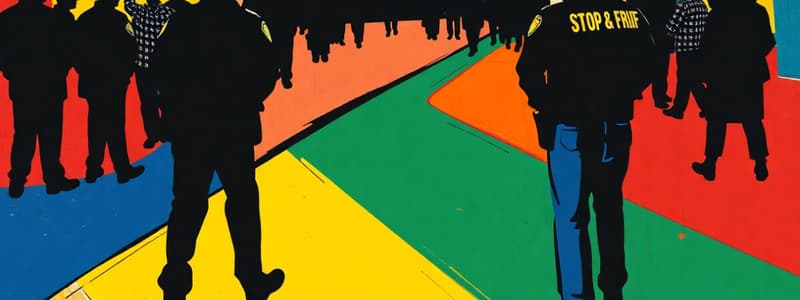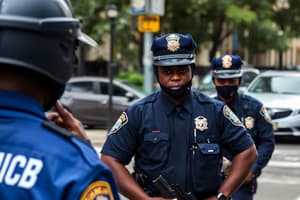Podcast
Questions and Answers
What is the primary focus of the policy outlined in the text?
What is the primary focus of the policy outlined in the text?
- To establish guidelines for conducting stops and frisks that comply with state and federal laws. (correct)
- To protect the rights of citizens from unreasonable searches and seizures, regardless of suspicion.
- To provide deputies with the authority to detain suspects in all instances.
- To ensure that deputies have probable cause before conducting a stop and frisk.
Under what circumstances can a deputy legally stop a suspect without probable cause to arrest?
Under what circumstances can a deputy legally stop a suspect without probable cause to arrest?
- When the deputy observes the suspect engaging in suspicious behavior, such as repeatedly looking around anxiously.
- When the deputy has reasonable suspicion that the suspect is involved in criminal activity. (correct)
- When the deputy has received an anonymous tip that the suspect is carrying a weapon.
- When the deputy has a hunch that the suspect may be involved in criminal activity.
What is the legal justification for conducting a frisk during a stop?
What is the legal justification for conducting a frisk during a stop?
- The deputy observes the suspect carrying an object that resembles a weapon.
- The suspect has been previously convicted of a violent crime.
- The deputy has a reasonable suspicion that the suspect may be armed and dangerous. (correct)
- The suspect refuses to provide identification when asked by the deputy.
What is the meaning of "area of immediate control" as defined in the text?
What is the meaning of "area of immediate control" as defined in the text?
According to the policy, which of the following activities is NOT considered criminal activity?
According to the policy, which of the following activities is NOT considered criminal activity?
What is the primary purpose of a frisk conducted by deputies?
What is the primary purpose of a frisk conducted by deputies?
What constitutes 'reasonable suspicion' for a deputy?
What constitutes 'reasonable suspicion' for a deputy?
What is a non-suspect in the context of law enforcement?
What is a non-suspect in the context of law enforcement?
Which of the following is true regarding the authority to stop and frisk a person?
Which of the following is true regarding the authority to stop and frisk a person?
What should deputies consider when conducting a stop or frisk?
What should deputies consider when conducting a stop or frisk?
Flashcards
Area of Immediate Control
Area of Immediate Control
The area within a person's reach where they could immediately access a weapon.
Armed
Armed
Carrying a weapon or object capable of inflicting serious harm.
Criminal Activity
Criminal Activity
Crimes like burglary, robbery, or drug offenses, or crimes that put people or property at risk.
Detention (Stop)
Detention (Stop)
Signup and view all the flashcards
Frisk
Frisk
Signup and view all the flashcards
Non-Suspect
Non-Suspect
Signup and view all the flashcards
Reasonable Suspicion
Reasonable Suspicion
Signup and view all the flashcards
Voluntary Contact
Voluntary Contact
Signup and view all the flashcards
Probable Cause
Probable Cause
Signup and view all the flashcards
Study Notes
Bexar County Sheriff's Office Policy Manual - Stop and Frisk
- Original Date: December 1, 2003
- Effective Date: March 19, 2024
- Chapter Number: Seventeen
- Office: Patrol Division
- Reevaluation Date: March 19, 2025
- Pages: 6
- Supersedes: April 30, 2014
- Approved by: Javier Salazar, Bexar County Sheriff
17.01 Policy
- Purpose: To protect citizens from unreasonable searches and seizures but acknowledge the need for officer safety and contact with members of the public as suspects or witnesses in criminal investigations.
- Reasonable suspicion: Allows for a stop of a suspect on the street without probable cause for an arrest.
- Frisk: A weapons search authorized if a deputy reasonably suspects the suspect is armed.
17.02 Purpose
- Policy provides guidelines for stops and frisks, consistent with state and federal laws.
17.03 Definitions
- Area of Immediate Control (AIC): The area around a person where they might reach for a weapon.
- Armed: Carrying a weapon or object capable of inflicting serious injury.
- Criminal Activity: Serious crimes (e.g., burglary, robbery, drug offenses) or crimes posing risk to people or property (public intoxication, disorderly conduct, criminal mischief)
- Detention (Stop): Action making a person believe they aren't free to leave.
- Frisk: Limited pat-down of outer clothing to assess for weapons, based on articulable facts.
- Non-Suspect: Person with no reasonable suspicion of criminal activity.
- Probable Cause: All facts that would lead a prudent person to believe a crime was committed.
- Reasonable Suspicion: Credible information and circumstances indicating a crime might be, or has been committed.
- Suspect: Person a deputy reasonably suspects of involvement in criminal activity.
- Voluntary Contact: Interaction where a reasonable person would feel free to leave.
17.04 General Rules
- Lawful stops and frisks: Must be authorized by law and the manual.
- Terms Defined: Definitions should align with the chapter for clarity.
- Prohibited considerations: Deputies cannot conduct stops and frisks based on unlawful factors like race, ethnicity, gender, etc. This only applies when the characteristics are not part of a suspect description.
- Purpose of frisk: To allow investigations without fear of violence to officers, public, or suspects, not to discover a crime itself.
- Authority: A frisk doesn't automatically follow a stop; additional justification is needed.
17.05 Interviewing Non-Suspects
- Deputies can ask questions: Can ask non-suspects to stop, identify themselves, and answer questions.
- Right to refuse: Non-suspects have the right to refuse to stop or answer questions.
- Detention is restricted: Cannot detain a person without reasonable suspicion.
- Identification requirements: Deputies must identify themselves and their agency.
- Voluntary interaction: Interaction must be voluntary, the non-suspect is free to leave.
17.06 Stops for Questions
- Reason for questioning: Deputies can stop and question if there's reasonable suspicion of current, past, or imminent criminal activity.
- Subject Identification: If a suspect refuses to Identify themselves, detention is allowed to identify.
- Supervisory approval: Deputies will first need supervisory approval prior to transport for fingerprinting and photography.
- Justification for stop: Deputies must Articulate a reason and specific circumstances justifying a stop.
- Factors justifying a stop: Certain suspicious movements, suspect descriptions (wanted notice), recent crime scene proximity, unusual conduct, or information linking the suspect to criminal activity.
- Questions to witnesses: Can question potential witnesses if injury or property theft has recently occurred nearby.
17.07 Frisks for Weapons
- Reason for frisks: Deputies can frisk if there's a reasonable suspicion that the suspect is armed and dangerous, enabling officer and public safety.
- Factors justifying a frisk: Fleeing from an officer, threatening or belligerent behavior, failing to identify.
- Suspect's demeanor: Bulges or unusual behavior can raise reasonable suspicion and trigger a frisk.
- Unlawful Weapon Search: Weapons must only be searched in their immediate control areas.
- Special considerations for females: Male deputies need to be aware of conducting a frisk based on the need to be least intrusive and offensive . Using visual cues first (looking for bulges), and contact if necessary, and use of less forceful methods if a weapon is visible.
- Prioritization of visual assessment: The use of visual assessment is the first step in determining whether a frisk is necessary.
Studying That Suits You
Use AI to generate personalized quizzes and flashcards to suit your learning preferences.
Related Documents
Description
This quiz covers Chapter Seventeen of the Bexar County Sheriff's Office Policy Manual, focusing on the Stop and Frisk procedures. It outlines the policy's purpose, reasonable suspicion criteria, and definitions related to officer safety and citizen protection. Participants will enhance their understanding of police practices and legal standards.




